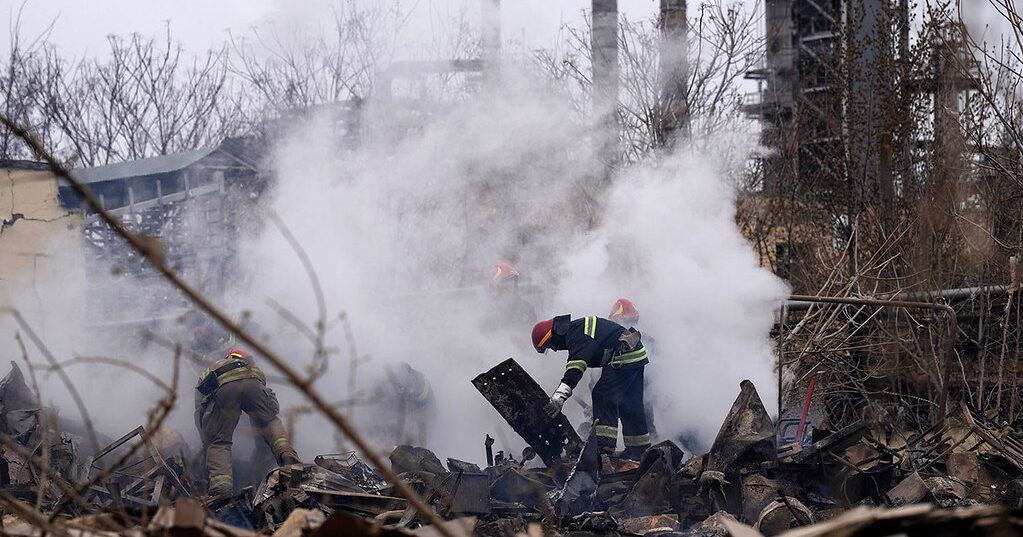

The atrocities committed by Russian forces against the civilian population of Ukraine, the flight of millions of refugees, and the onset of a veritable Cold War of sanctions by Nato and G7 states has thrown the world into a whole new situation, one in which a war between Russia and Nato is not unthinkable.
The blowback from war and sanctions includes steep rises in the prices of gas and oil, various food grains, sunflower oil and fertilisers that could condemn populations around the world to soaring inflation and hunger.
The misery caused by Putin’s invasion in Ukraine and the economic chaos threatened by Nato’s response pose the question of how a war like this can be brought to an end. What is certain is that none of the main combatants, Vladimir Putin, Volodymyr Zelensky or Joe Biden can be expected to do so in a way that ensures a stable and lasting solution for the peoples of the region. Though Putin is the direct instigator, all of them played roles in the lead up to this conflict that preclude them from offering a democratic and permanent solution to it.
Working class
It is to the actions of the working class and the masses of ordinary people of Ukraine, Russia, and the Nato countries, too, that we must look for an answer. In Ukraine, as well as the suffering, we are witnessing an extraordinary mobilisation of the people. They are joining the army, the territorial defence forces, they are organising barricades, hospital care, food supplies and even demonstrations against Russian troops in the occupied cities.
War radicalises and expands people’s expectations and needs. Even when the fighting stops, a people that has taken its fate into its own hands will not easily be returned to passive acceptance of what the nationalist politicians, and the oligarchs, dictate. This will be effective if they refuse to be disarmed and ensure that neither government forces nor fascist gangs take control. Workers’ and popular militias need to be created and workers’ control over reconstruction organised. Ukraine needs an internal political solution which includes the right of all its language groups and ethnicities to decide to which state they belong, or what form of self-government they desire.
Revolutionary perspective
The Russian people are also victims of Putin’s war. The reality of that war has been concealed from them but returning soldiers will be spreading the word of the horrors they have seen committed and their own suffering. If Putin’s ‘special military operation’, and his latest plan to partition Ukraine, end in defeat, then a popular upheaval could see him driven from power. A revolutionary situation could emerge in which Putin’s ‘managed capitalism’ and ‘managed democracy’ can be called into question. Here, too, the workers and the youth can play a leading role in destroying not only Putin and his Federal Security Service (FSB) dictatorship, but the capitalist system itself.
Both Ukraine and Russia need to end the war in revolution—a revolution that will redress all the crimes committed, not only those against the Ukrainian people as a whole but also those by Ukrainian governments since 2014 against the people of the Donbas. Peace and reconciliation between the two countries will require a revolution in both. It will no doubt start from these vital democratic issues but, to address the dire economic needs of the two peoples, will require the uprooting of oligarchic capitalism. It will also need to prevent a wholesale takeover by US and EU multinationals, driven by the IMF’s neoliberal ‘reforms’, such as privatisation and austerity budgets, that have devastated their economies time and time against since the 1990s.
Internationalism
Finally, it is the urgent duty of socialists and the labour movements in Europe and America to restrain and halt the drive to war, cold and hot, being prepared by the Nato governments on both sides of the Atlantic. This must include mobilising against the huge increase in Germany’s arms spending, the return of large numbers of US forces to Europe, the escalation of military support to Ukraine and the threat of a direct Nato intervention. Already, there is galloping inflation and the spectre of unemployment, caused by the dislocation of international production chains. Even more catastrophic results can be expected if Nato’s sanctions are extended to China, as Biden has threatened.
The workers’ movement in Europe and North America must include in its agitation not only the welcoming and care of refugees from Ukraine but also the extension of ‘open borders’ to those from Syria and other war-torn regions. In Britain, this has to mean abolition of the shamefully racist restrictions on visas.
The war and its aftermath show that we face once again the task which Marx first set out in his Inaugural Address of the First International in 1864—that the labour movements had ‘…the duty to master themselves the mysteries of international politics; to watch the diplomatic acts of their respective governments; to counteract them, if necessary, by all means in their power.’
The means to do this today, as then, is an international organisation of the class conscious proletariat, whose foundations we need to lay in our mobilisation against war and capitalist crisis – a Fifth International. Its slogan will be that of the Third International: workers and oppressed peoples of the world, unite!